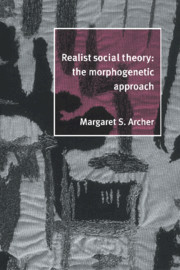Book contents
- Frontmatter
- Contents
- List of figures
- Acknowledgements
- 1 The vexatious fact of society
- Part I The problems of structure and agency: four alternative solutions
- 2 Individualism versus Collectivism: querying the terms of the debate
- 3 Taking time to link structure and agency
- 4 Elision and central conflation
- 5 Realism and morphogenesis
- Part II The morphogenetic cycle
- Index
3 - Taking time to link structure and agency
Published online by Cambridge University Press: 02 December 2009
- Frontmatter
- Contents
- List of figures
- Acknowledgements
- 1 The vexatious fact of society
- Part I The problems of structure and agency: four alternative solutions
- 2 Individualism versus Collectivism: querying the terms of the debate
- 3 Taking time to link structure and agency
- 4 Elision and central conflation
- 5 Realism and morphogenesis
- Part II The morphogenetic cycle
- Index
Summary
The ‘problem of structure and agency’ is now a familiar phrase used to denote central dilemmas in social theory – especially the rival claims of voluntarism versus determinism, subjectivism versus objectivism, and the micro- versus macro-scopic in sociology. These issues are central for the simple reason that it is impossible to do sociology at all without dealing with them and coming to decisions about them. These issues are problematic for any social theorist who cannot come down with conviction on one side or the other; and that means a great many of us, each of whom is then of necessity in the job of reconciliation. Imperative as this is, the urgency of the ‘problem of structure and agency’ is not one which imposes itself upon academics alone, but on every human being.
For it is part and parcel of daily experience to feel both free and enchained, capable of shaping our own future and yet confronted by towering, seemingly impersonal, constraints. Those whose reflection leads them to reject the grandiose delusion of being puppet-masters but also to resist the supine conclusion that they are mere marionettes then have the same task of reconciling this experiential bivalence, and must do so if their moral choice is not to become inert or their political action ineffectual. Consequently, in facing-up to the ‘problem of structure and agency’ social theorists are not just addressing crucial technical problems in the study of society, they are also confronting the most pressing social problem of the human condition.
What is to be developed in this book is a theoretical approach which is capable of linking structure and agency rather than sinking one into the other.
- Type
- Chapter
- Information
- Realist Social TheoryThe Morphogenetic Approach, pp. 65 - 92Publisher: Cambridge University PressPrint publication year: 1995



